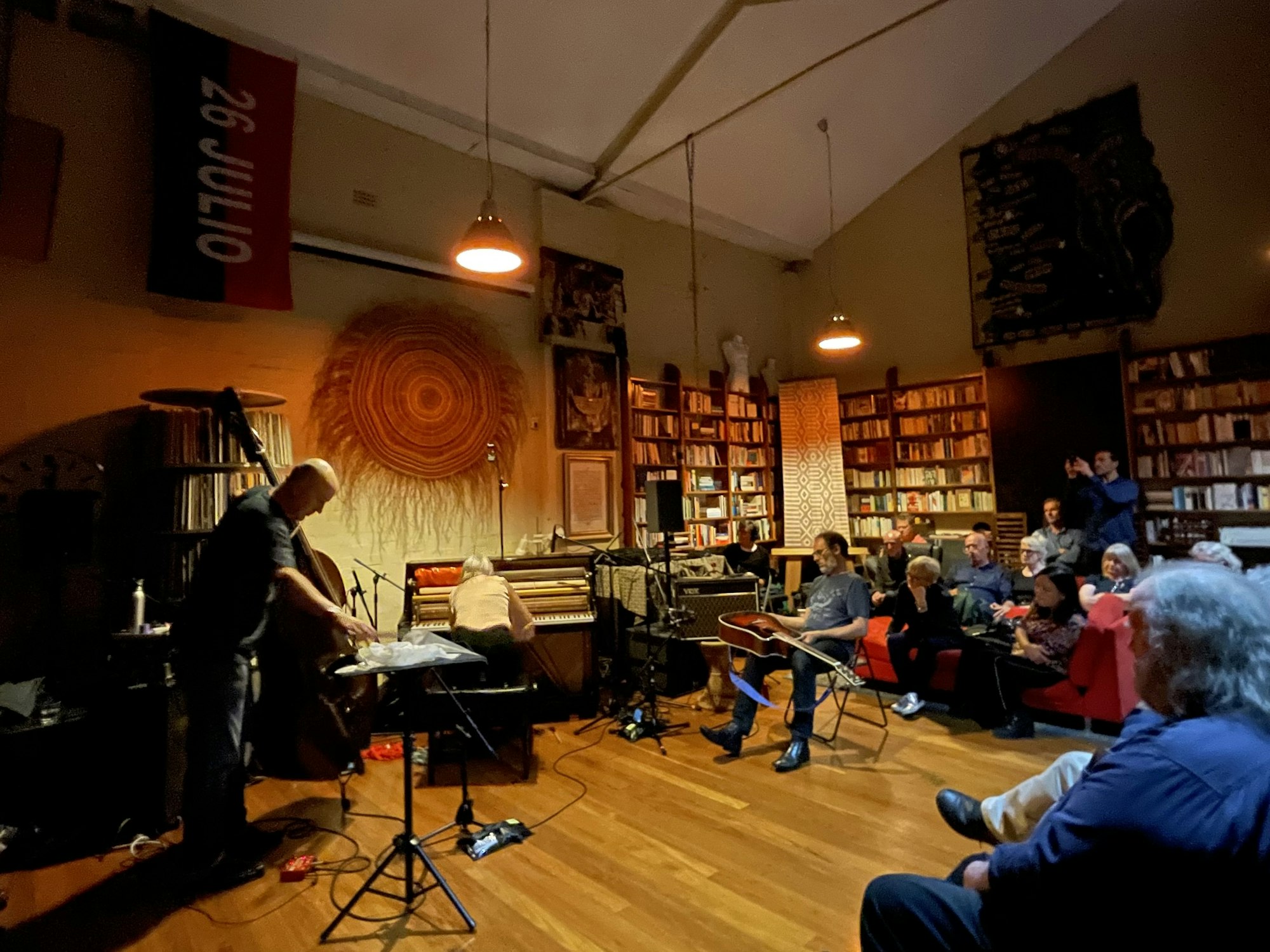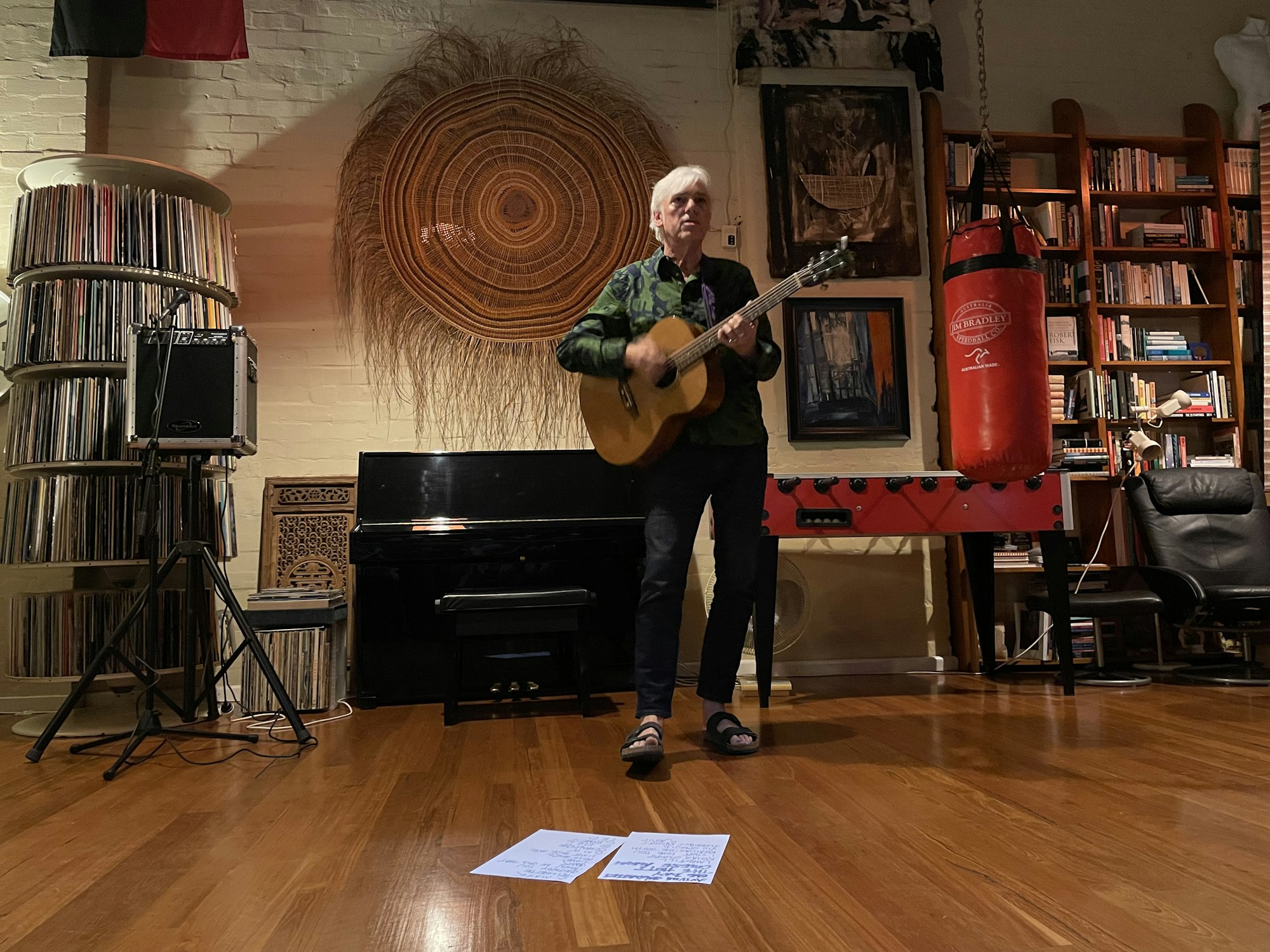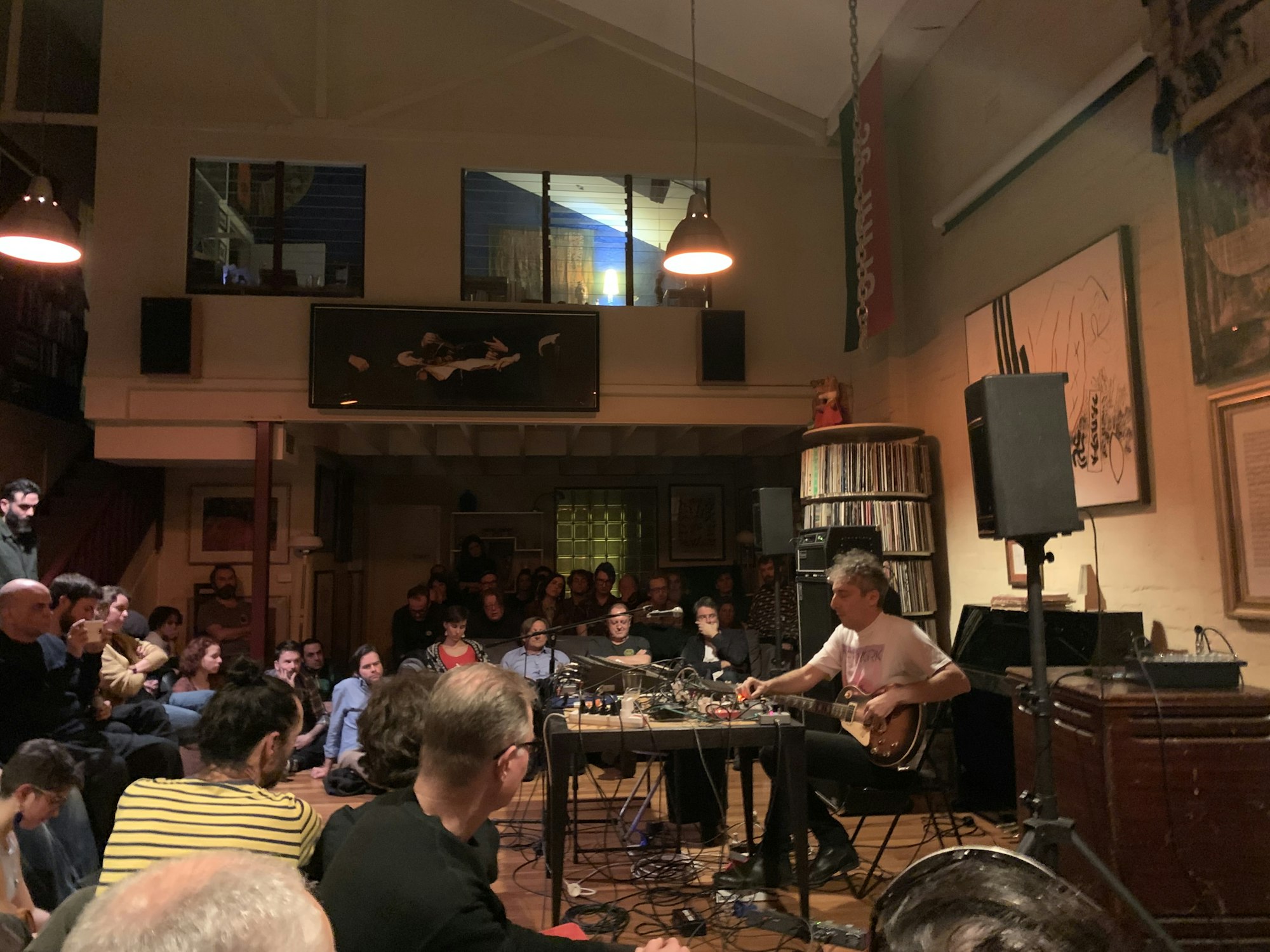"This place would not exist without the audience": Nick Shimmin of the People’s Republic on creating Sydney's most unique house shows

It all started with a car ride. Nick Shimmin was checking out an exhibition of a mate’s in Turramurra, and was asked if he’d give someone a ride home.
That “someone” was Hollis Taylor, the partner of Jon Rose — a pioneer of Australian experimental music — and that car ride led to a friendship, then a simple question: “What if I did a gig in your living room?”
The People’s Republic is a series of house shows hosted in Shimmin’s Camperdown living room. It’s been running for almost 13 years, and in that time they’ve done about 120 gigs, with a wide range of performances ranging from their core lane of improvised experimental music to folk, jazz, electronica, and acoustic rock. Performers have ranged from experimental legends like Oren Ambarchi, Jon Rose, and members of The Necks, to talent you’ll often find in more conventional venues: The Holy Soul, Toby Martin (of Youth Group), Kim Salmon (of The Scientists), Robyn Hitchcock, Party Dozen, and many many more.
I caught up with Nick to chat about the project and how it works. He's a passionate interviewee — our conversation began at full speed right from the moment he offered me a cup of tea, and I only got to switching on my recorder once we got ourselves seated. So let’s start with where I hit record: the topic of money.
—
Talk to me about how the “free with donation” concept works.
There is an ethic which has emerged behind what I do to do with every gig being free.
The email list we built up has generated a whole bunch of regulars who will come along to see people they haven't heard of. If I was selling tickets, that wouldn't happen. The difference between coming to a gig and walking out [afterward] and dropping money in a jar is profound, compared to even if you've only paid $10 for a ticket. If you've paid $10 for a ticket in advance, you turn up wanting to be entertained or wanting to get something for that $10.
And if it is at your discretion to decide — and people have said this to me, they come not knowing what to expect and are blown away by a performance here — they'll drop a $20 or $50 note.
I've also had people walk out of here saying "Well, I dropped $10 in when I came in, I wish I could take it out again. It was bloody awful!" And I say to them "You can if you want! I don't mind — that's cool!”
I do agree with you that people are often more generous when they get to consider for themselves what the experience is worth to them.
I think that the whole audience experience is important here, you know, the fact that a punter can go and chat to musicians and chat to other people — that just contributes to that experience.
And the atmosphere is partially created by the people that turn up, right? There's a far more open ended contract: people turn up and they help to create that relationship people have with the space.
Some people have used the word "salon" to describe what I'm doing now — like the turn of the previous century, people in big houses used to invite people around to see piano recitals and stuff. You know, you watch a series like The Gilded Age and people would have a salon.
It's not that, in a sense — what I'm trying to do is the opposite of that, because I really do want to broaden out the audience, I do want people to come here that can very easily drop a $50 note in the jar, but I also want the students from the Con that can only drop in a $2 coin. I want both of those. And the only way for me to be able to continue to do that is to make the gigs free.
There are challenges with that. It's very hard to communicate to an artist — particularly international artists — in a couple of minutes, the nature of what we do, because I don't want to walk up and say "You're gonna walk out with $1000", even though everyone would now, especially if they're international. Because that sounds creepy in a way. And I don't think it's the most important part of playing here.

It's breaking this nexus between needing to make money to do something valuable in the arts. And it becomes a strike against that overwhelming capitalist impulse that we are all comprehensively dictated by, especially in big cities now. It has become that thing, and I don't think that is overstating the case, to be honest. And I fell into it — I didn't do it intentionally. But I wish to remain there partly as an example of doing that.
But it's even bigger than that, in terms of, I think, one of the great evils of capitalism in a way — and certainly neoliberal capitalism, post-1980 — has been the obsession [of] every organisation and every operation with growth.
So am I going too far to say that the People's Republic is promoting a different way to support artists, a different way to approach how musicians get paid for their work?
I would challenge the use of the word “promoting” because we're not promoting anything, what we are doing is just existing, and that provides an example.
People that want to look at that example… which is why whenever I get a request to do an interview like this I’m always very happy to do it, however much time you might want. Because that's all I want. I'm not going out there proselytising about this, even though I can talk endlessly about this aspect of it. But yes, I think it is a fundamentally different way of doing things.
So if you were to be asked “What is the People's Republic?”, it sounds to me that it’s the space, that's what people identify with it. You yourself are relatively transparent within the identity of tPR. I really like what you say about the importance of the space for the artist, and the fact that artists need spaces to exist. What do you think the importance of the space is for the community?
It is of equal importance, and I've said this to numerous people. I think I actually said it at the 10th anniversary: this place would not exist without the audience. And if I now get a gig where only 50 people turn up, I'm really disappointed. But we have to make it a rewarding experience for them.
Getting the neighbours onside is important. But the immediate neighbours, again, they're cool with the noise, because — you know, that's very kind of them on that side, clearly, because we have shared walls — but we finish early. It's only occasionally, once a month.
The only complaint I've had here is when I put a band on the roof. And someone across the road called the police. All the other neighbours were trying to get him to shut up because he was actually, at the end, just throwing rocks at the roof! The band was playing like raga-type things at sunset. And the police turned up and said, "Actually, you know, there's no problem here..."
You're legally allowed to make noise until 10:30pm on a weeknight!
Yes! It was 7pm and no one was blocking the footpath — they were all kind of spread out across the road. So they just said “You'd better let the neighbours know if you do it again”. Yeah, it was kind of interesting. And that I've learned that lesson. I mean, I've never done it again. But it was kind of worth it, because you know, it's been an evolution finding out what you need to do in this situation.
I think especially creating an environment of good faith, you kind of need to model it as much as you expect it from the people that you have an unspoken or unarticulated contract with — how you relate to your neighbours and anyone that your activities affect. At the end of the day, that's how this whole society thing hangs together…
The most common thing that people say to me is "100 people in your house? I couldn't do it." I say, "Well, to be honest, the first couple of gigs will be like that!"

But I think what happens here now is that the regulars ... you know, they're kind of keeping an eye on people! The community now and the audience here have a stake in keeping it going. They know if a bunch of my possessions disappeared, I'd shut it down. I haven't said as much! But everyone knows that, you know. The one or two times we've had a few people here [who] have been drunk — that rarely happens, but it's happened a couple of times — and the audience will tell them to shut up. Because everyone's aware this is someone's house, and you don't want to put that person in a position of not wanting to keep on doing it. So that works as a community as well.
You've got some pretty firmly developed principles by now — for something that began so organically, you seem to have strong strongly developed convictions over how this runs.
Yes. It has become, entirely independently of anything I intended, something that is of importance to a community of artists and, you know, a community of an audience. And so yeah, I'm very committed to those people. A lot of them have become friends, And we want to keep this going.
I also want to remain here as an example for anyone else who is inclined. I know a few people have started to do house concerts as a result of coming here. Felicity Wilcox, the pianist, for example — she has gigs at her house up in the Blue Mountains, because she came here.
It gets back to the profit motive thing — I mean, it has to be zero sum for me. If there are costs incurred, I'd have to recover those costs. There almost never are, but if someone needs a piece of equipment that I have to call for... But I mean, this is one of the great things about having Matt doing sound now, that he can find anything — you know, when Oren Ambarchi asked about a Leslie speaker ... Yeah, we had trouble finding that, but we got it. And the thing is I can pull in a lot of favours now. I pull in a lot of favours from people. Again, it's this community of artists [who] want it to happen.
Kim Salmon, who is very into, you know, getting paid properly — because he really resents the fact that, you know, fucking Nirvana and people like that saying "Well we wouldn't have existed without The Scientists", and they were sleeping, you know, shared floors back in the day when the band was going, he sort of resents that and feels that he's never had his due. But even he, he's probably played here three or four times now. He's perfectly happy with a thousand bucks. For him, actually, it's the experience: because he plays festivals and pubs and to have, you know, 80-90 people, you know, quietly listening to what you do, and then coming up and chatting to you afterwards — he's quite shy, Kim — but he just loves it. But he ended up going to the merch table and selling the merch himself.
One thing we're hoping with SydneyMusic is that we will encourage people to start stuff, whatever it is, whether it's one-off, or whether they start a series. I think everyone needs to realise that it's far more within their ability than they might think it is to get people into a space, have a shared experience... So if someone came up to you and said, “Hey, I want to start something like what you’re doing”, what sort of ideas or principles would you leave them with to think about?
Well, to some extent, what you just said: that it's an awful lot easier than you think it's gonna be!
You need to have the luxury of time. You need to be patient and not have financial imperatives that mean that you can't conceive of building it up over a couple of years. Because if you need an immediate return, you're probably going to fail. Because publicity and marketing, it’s tougher than ever with the fragmentation of how you can get people aware of your project, it’s very difficult — unless you're going to spend money, and no one really wants to do that. It's just another overhead. So you need that patience.
We build our email list now largely on the basis of who comes to the gigs, people heard about it. So new people come to see something that they're interested in, that they've heard of. If they will then come to something that they haven't heard of, that's a really important part of what we do: opening people up to different things. So, the core of the People's Republic is improvised experimental music. But it is really important that we do Dave Graney, Robyn Hitchcock, Toby Martin, Kim Salmon, people like that...
Party Dozen, interestingly, were the crucial ones. I just stalked Jono [Boulet] for a couple of years to get them to agree to play here: "We can't play in a living room!". But almost everyone that came to that gig — because it was our anniversary gig — had never heard of them. And, you know, dozens of people walked out at the end saying "Fucking hell,, they were great!" And again these are the really rewarding things for me: getting that age group, getting an older demographic to listen to something like that.
But we need to have that diversity because we've got to get audiences in to broaden their horizons, and one of the opportunities when you've got free gigs is that you can get people in. Because this is a curated series I have a sort of responsibility, but it's also an opportunity - a huge opportunity! - to get people to come and listen to things they wouldn't otherwise listen to.
So, you know, I hope you can encourage other people to do projects. The key message is that it's relatively easy to do — but I think maybe you will need to offer advice. Say “if you have an idea, in this field, come and talk to us about it” - and then come and talk to me! I have 12 years experience doing this — I have that opportunity that if I can help anyone do any of this stuff, then please come talk to me!
This interview has been edited for clarity. Nick is currently working on a new People’s Republic space, details of which we’ll share when he’s ready to announce it!
Want to be notified about upcoming People's Republic shows? You can request to be added to the mailing list by sending Nick an email.
- by
- Joe Hardy
- Published
- 11 July 2022
More reads
Welcome to SydneyMusic.net
Live music in Sydney is still clawing its way back to normalcy after a bruising decade of lockouts and lockdowns — but there's good stuff out there, and this site exists to help you find it.
"You don't need permission to do it yourself": Nick Ward on the Brockhampton Effect and Sydney's artist-driven future
"We're in this weird, fluid time in Australian music history where I feel like it's really fertile ground for people who have a really strong idea of what they want to do."
"The more you invest in the arts, the healthier the scene will become": Kirsty Tickle of Party Dozen on DIY and the dire state of arts funding
In the debut edition of our occasional Q&A feature, Kirsty gives us an intro to the community that Party Dozen came from, some thoughts on what can help our local community thrive more, and the importance of a broken PA in becoming a great performer.
"We drove up the street handing it to people out the window": The Cannanes on how their joke band took them everywhere
From making fantasy gig posters in Chippendale, to being hailed by NME and invited overseas for tours: The Cannanes reflect on their DIY ethos, how Sydney’s changed over the decades, and their experiences with music communities internationally.